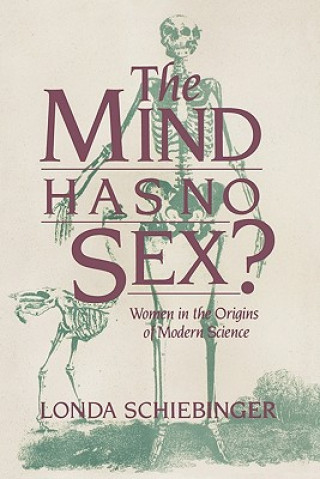
Kód: 02704907
Mind Has No Sex?
Autor Londa Schiebinger
As part of his attempt to secure a place for women in scientific culture, the Cartesian Francois Poullain de la Barre asserted as long ago as 1673 that the mind has no sex? In this rich and comprehensive history of women's contrib ... celý popis
- Jazyk:
 Angličtina
Angličtina - Vazba: Brožovaná
- Počet stran: 368
Nakladatelství: Harvard University Press, 1991
- Více informací o knize

Mohlo by se vám také líbit
-

Behavior of Chemical Elements in Stars
4673 Kč -

Cambridge Companion to the French Novel
2791 Kč -

Transatlantic Sketches
1583 Kč -

Prague Travel Guide
316 Kč -

Jujitsu
567 Kč -

Belief and Organization
3313 Kč -

Minerva Mint Pack B of 3
671 Kč
Darujte tuto knihu ještě dnes
- Objednejte knihu a zvolte Zaslat jako dárek.
- Obratem obdržíte darovací poukaz na knihu, který můžete ihned předat obdarovanému.
- Knihu zašleme na adresu obdarovaného, o nic se nestaráte.
Více informací o knize Mind Has No Sex?
Nákupem získáte 174 bodů
 Anotace knihy
Anotace knihy
As part of his attempt to secure a place for women in scientific culture, the Cartesian Francois Poullain de la Barre asserted as long ago as 1673 that the mind has no sex? In this rich and comprehensive history of women's contributions to the development of early modem science, Londa Schiebinger examines the shifting fortunes of male and female equality in the sphere of the intellect. Schiebinger counters the great women mode of history and calls attention to broader developments in scientific culture that have been obscured by time and changing circumstance. She also elucidates a larger issue: how gender structures knowledge and power. It is often assumed that women were automatically excluded from participation in the scientific revolution of early modem Europe, but in fact powerful trends encouraged their involvement. Aristocratic women participated in the learned discourse of the Renaissance court and dominated the informal salons that proliferated in seventeenth-century Paris. In Germany, women of the artisan class pursued research in fields such as astronomy and entomology. These and other women fought to renegotiate gender boundaries within the newly established scientific academies in order to secure their place among the men of science. But for women the promises of the Enlightenment were not to be fulfilled. Scientific and social upheavals not only left women on the sidelines but also brought about what the author calls the scientific revolution in views of sexual difference? While many aspects of the scientific revolution are well understood, what has not generally been recognized is that revolution came also from another quarter--the scientific understanding of biological sex and sexual temperament (what we today call gender). Illustrations of female skeletons of the ideal woman--with small skulls and large pelvises--portrayed female nature as a virtue in the private realm of hearth and home, but as a handicap in the world of science. At the same time, seventeenth- and eighteenth-century women witnessed the erosion of their own spheres of influence. Midwifery and medical cookery were gradually subsumed into the newly profess ionalized medical sciences. Scientia, the ancient female personification of science, lost ground to a newer image of the male researcher, efficient and solitary--a development that reflected a deeper intellectual shift. By the late eighteenth century, a self-reinforcing system had emerged that rendered invisible the inequalities women suffered. In reexamining the origins of modem science, Schiebinger unearths a forgotten heritage of women scientists and probes the cultural and historical forces that continue to shape the course of scientific scholarship and knowledge.
 Parametry knihy
Parametry knihy
Zařazení knihy Knihy v angličtině Society & social sciences Society & culture: general Social groups
1744 Kč
- Plný název: Mind Has No Sex?
- Autor: Londa Schiebinger
- Jazyk:
 Angličtina
Angličtina - Vazba: Brožovaná
- Počet stran: 368
- EAN: 9780674576254
- ISBN: 067457625X
- ID: 02704907
- Nakladatelství: Harvard University Press
- Hmotnost: 552 g
- Rozměry: 158 × 234 × 20 mm
- Datum vydání: 01. March 1991
Oblíbené z jiného soudku
-

Women Who Run with the Wolves
239 Kč -

Freedom Writers Diary
275 Kč -

Think Like a Monk
441 Kč -

Orientalism
306 Kč -

How Europe Underdeveloped Africa
531 Kč -

Desert Flower
286 Kč -

Why Does He Do That?
401 Kč -

Letters to a Young Muslim
303 Kč -
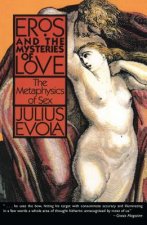
Eros and Mysteries of Love
407 Kč -

Life After Darkness
512 Kč -

Puer Tea
772 Kč -

Womanhood
605 Kč -

JFK - 9/11
734 Kč -

Complete Book of Pilates for Men
447 Kč -

Gypsy Identities 1500-2000
1641 Kč -

Colloquial Yiddish
1683 Kč -

Sword of No-sword
646 Kč -

Servitors of Empire
478 Kč -
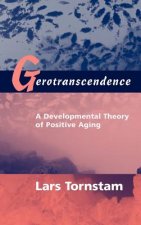
Gerotranscendence
3473 Kč -

Northwest Coast Indian Art
702 Kč -

Qur'an
811 Kč -

When God Was A Woman
498 Kč -

The Mastery of Love
306 Kč -

Vintage Menswear
435 Kč -

Who Cooked the Last Supper?
429 Kč -

Women Who Run With The Wolves
410 Kč -

The Way of Men
332 Kč -

The Autobiography of Malcolm X
222 Kč -

Second Sex
410 Kč -

Goddesses in Everywoman
303 Kč -

Talking with Female Serial Killers - A chilling study of the most evil women in the world
276 Kč -

Intellectuals and Society
537 Kč -

Women in the Qur'an
493 Kč -

Erotic Bondage Book
364 Kč -
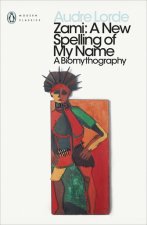
Zami
276 Kč -

Nine Years among the Indians, 1870-1879
620 Kč -

Dark Emu
410 Kč -

Childhood and Society
392 Kč -

Happy City
303 Kč -

The Male Nude
481 Kč -

The Bell Curve
464 Kč -

We Should All Be Feminists
213 Kč -

Empire of the Summer Moon
357 Kč -

Radium Girls
276 Kč -

Dance of Anger
276 Kč -

Beauty Myth
357 Kč -

Muqaddimah
541 Kč -

TROUBLEMAKER
363 Kč -
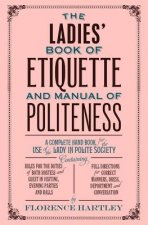
Ladies' Book of Etiquette and Manual of Politeness
306 Kč
Osobní odběr Praha, Brno a 12903 dalších
Copyright ©2008-24 nejlevnejsi-knihy.cz Všechna práva vyhrazenaSoukromíCookies



 Vrácení do měsíce
Vrácení do měsíce 571 999 099 (8-15.30h)
571 999 099 (8-15.30h)